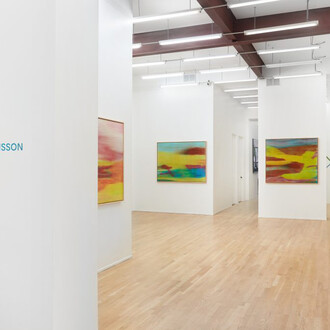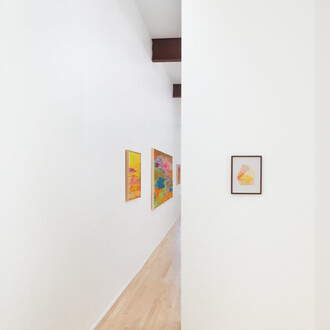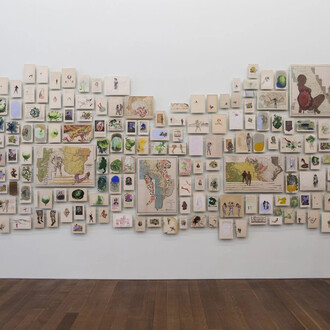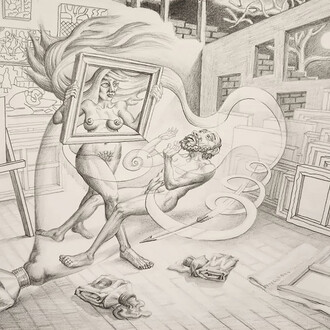Andrew Rafacz is thrilled to announce Mano de obra, a solo exhibition of new woven vessels from Salvador Dominguez, in Gallery One. The exhibition opens Friday, July 19th and continues through Saturday, August 31, 2024. This is the artist’s first exhibition with the gallery.
Mano de obra presents a series of intricately woven vessels constructed from pipe cleaners and referencing forms found historically in Mesoamerican and Ancestral Puebloan, Chinese, Egyptian, and Greco-Roman cultures, by way of contemporary materials. Employing pattern, vibrant shifting colors and abstracted pictographic imagery, Dominguez’s vessel forms occupy a unique space between painting, textile-making and functional design.
The colors and patterns of the works in Mano de obra act as a map of the artist's memories from his time in both Mexico and Southern California. Recalling colorfully painted homes, rainbow hued piñatas, and small statues on 99-cent store shelves, these memories act as markers of a culture that has evolved over time, related to Dominguez’s own evolving identity as both Mexican and American.
By way of the formal process of their construction, Dominguez draws inspiration from the traditional basket weaving techniques of Oaxaca, Mexico, skills that are often passed down from generation to generation. The artist recalls taking trips to open-air markets and seeing woven bags made of waxy, plastic materials, that drew on the tradition of tribal artisans, but were made curiously from imported materials. In this way, the knowledge of who and what inspired the making of the objects themselves was seemingly lost or unseen, much like the contributions of indigenous communities across the world.
Mano de obra translates to ‘workforce’ which, in macroeconomic terms, considers the entire pool of potential labor. The exhibition’s title references, both in process and in concept, the idea of unseen labor. Through the specific and repetitive process of weaving pipe cleaners into solid forms, Dominguez reflects on the often outwardly dutiful life of the immigrant. Through the sacrifice of labor, the day-in and day-out means of survival, the immigrant builds a life that reflects their ambition and culture.
He views this body of work as part of an ongoing dialogue with his mother, whose lifetime of domestic labor often went unseen, but whose imagination came alive through craft and embroidery. The works in Mano de obra were brought to fruition through direct collaboration with her. Their newfound language of weaving together stands outside any cultural or generational differences. Despite being separated by thousands of miles, their shared labor brings them closer together.
Salvador Dominguez (American, b. 1985 Zacatecas, Mexico) lives and works in Chicago, Illinois. He received his BFA from the School of the Art Institute of Chicago in 2008. Recent solo and group exhibitions include de boer (Los Angeles, CA), Western Exhibitions (Chicago, IL), DePaul Art Museum (Chicago, IL), Lubeznik Center for the Arts (Michigan City, IN), Ralph Arnold Gallery at Loyola University (Chicago, IL), Walker Art Gallery (Garnett, KS), National Museum of Mexican Art (Chicago, IL), Carroll University (Waukesha, WI), One After 909 (Chicago, IL), Thomas Masters Gallery (Chicago, IL), and the Ukrainian Institute of Modern Art (Chicago, IL). His work has been presented at art fairs in Chicago and Palm Springs, and is part of numerous private collections.
















